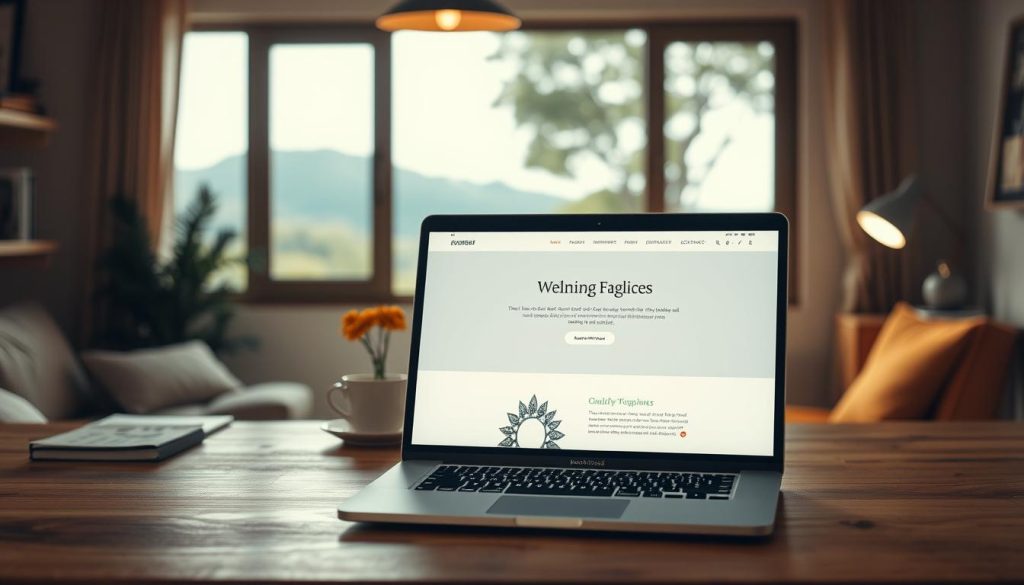Are you a freelancer struggling to establish a strong online presence and attract potential clients?
Establishing a professional website is crucial in today’s digital marketplace. It serves as your 24/7 representative, showcasing your skills and services. However, many freelancers delay building their website by overthinking every detail.
This guide will help you break down the process into manageable steps, ensuring success in your online endeavors. For more insights on building a successful freelance website, explore our resources.
Table of Contents
Key Takeaways
- Establish a professional online presence to attract clients.
- Break down the website creation process into manageable steps.
- Understand the importance of a website in showcasing your skills.
- Learn how to optimize your website for search engines.
- Achieve success in your freelance career through a well-designed website.
Why Every Freelancer Needs a Professional Website
A professional website serves as the foundation for a freelancer’s online identity, providing a platform to showcase their skills, services, and portfolio. It’s essential for establishing a credible online presence.
Having a professional website is crucial for several reasons:
- It acts as a central hub for your brand, connecting your marketing efforts and professional networks.
- Unlike social media platforms, a website gives you complete control over how your brand is presented.
- A website allows you to showcase your portfolio and services in a structured manner.
Establishing Authority and Credibility
A professional website helps establish your authority and credibility in your field. By showcasing your work and services, you demonstrate your expertise to potential clients.
Creating a Central Hub for Your Brand
Your website is the central location where potential clients can learn about your freelance business, access your content, and understand your value proposition. It evolves with your brand, allowing for updates in positioning, services, and portfolio as your business grows.
Starting with a Minimum Viable Website Approach

A minimum viable website is a practical starting point for freelancers looking to establish an online presence. This approach allows freelancers to test their online identity, gather feedback, and iterate without excessive upfront investment.
By focusing on the essentials, freelancers can launch their website quickly, start engaging with potential clients, and refine their online strategy over time.
The Benefits of a One-Page Website
A one-page website offers several benefits for freelancers, including simplicity, ease of maintenance, and a focused narrative. This streamlined approach enables potential clients to quickly understand the freelancer’s services and value proposition.
With a one-page website, freelancers can effectively communicate their brand message, showcase their portfolio, and include a clear call to action, all within a concise and easily navigable format.
What to Include on Your Starter Page
Your starter page should begin with a compelling headline and a brief value proposition that clearly communicates what you do and who you serve. It’s essential to include a concise problem statement that resonates with your target clients, showing that you understand their challenges.
The page should also highlight your services, emphasizing the benefits clients will receive, and include social proof such as testimonials or case studies to establish credibility. A clear call to action and contact information are crucial elements to include.
Naming Your Freelance Business
Choosing the right name for your freelance business is a crucial step towards establishing a professional online presence. Your business name is the cornerstone of your brand identity and plays a significant role in how clients perceive you.
Using Your Personal Name vs. Creating a Business Name
When deciding on a name, you have two primary options: using your personal name or creating a distinct business name. Using your personal name can add a personal touch and is simpler, but it may limit your business’s growth and flexibility. On the other hand, a business name can be more versatile and help in building a separate brand identity. Consider what aligns best with your long-term business goals.
Ensuring Consistency Across All Platforms
Once you’ve decided on your brand name, it’s crucial to ensure consistency across all platforms. This includes your website domain, social media handles, and email address. Consistency strengthens your brand recognition and makes it easier for clients to find you online.
- Check the availability of matching domain names, social media handles, and email addresses before finalizing your business name.
- Using the same name, logo, and visual elements across your online presence creates a cohesive professional image.
- Inconsistent branding can confuse potential clients and dilute your marketing efforts.
| Platform | Importance | Action |
|---|---|---|
| Website Domain | High | Register a matching domain name |
| Social Media Handles | High | Secure consistent handles across platforms |
| Email Address | High | Create a professional email address |
« Your brand is what other people say about you when you’re not in the room. » – Jeff Bezos
By carefully choosing your business name and ensuring its consistency across all platforms, you lay a solid foundation for your brand’s identity and online presence.
Purchasing the Right Domain for Your Freelance Website
Purchasing the perfect domain for your freelance website is a vital step towards building a credible and accessible online platform. Your domain name is a critical component of your brand’s identity and plays a significant role in how potential clients find and remember you.

Choosing a Domain That Matches Your Brand
When selecting a domain, it’s essential to choose a name that aligns with your brand identity. Opt for a domain that is memorable, easy to spell, and reflects your professional brand. This will help in establishing a consistent brand image across all your online platforms.
Consider using your business name or a variation of it as your domain name. This not only reinforces your brand but also makes it easier for clients to find you online.
Domain Providers and SEO Considerations
When purchasing a domain, consider the provider’s reputation, customer support, and additional features such as privacy protection. Many website builders like Squarespace, Wix, or WordPress.com offer domain registration as part of their packages, simplifying the setup process.
- Choose a reputable domain registrar that offers good customer support, fair renewal prices, and additional features like privacy protection.
- Consider SEO implications when selecting your domain—keywords in your domain can potentially help with search engine rankings, though this is less important than it once was.
- Domain age can impact SEO, so if possible, purchase a domain you plan to keep for the long term rather than changing it frequently.
- Set up domain privacy protection to prevent your personal contact information from being publicly accessible in the WHOIS database.
- Configure your domain correctly with proper redirects (www vs. non-www) and SSL certificates to maximize SEO benefits and ensure security for your visitors.
By carefully selecting and configuring your domain, you can enhance your website’s visibility on search engines and improve your overall online presence.
Selecting the Perfect Website Template

The ideal website template should reflect a freelancer’s brand identity and provide a seamless user experience. With numerous options available, it’s essential to consider the specific needs of your freelance business. A well-designed website template can enhance your online presence and attract potential clients.
When selecting a template, look for features that benefit freelancers, such as customizable layouts, mobile-responsive design, and integrated tools for scheduling and contact forms.
Template Features That Benefit Freelancers
Key features to look for in a website template include portfolio layouts, e-commerce capabilities, and blogging functionality. These features can help you showcase your work, sell products or services, and establish your authority in your niche.
A good template should also have built-in SEO tools to improve your site‘s visibility on search engines.
Popular Website Builders for Freelancers
Popular website builders like Squarespace, WordPress, Wix, and Webflow offer different advantages for freelancers. Consider factors like pricing, ease of use, and available templates when choosing a site builder.
Many platforms offer free trials or limited free plans, allowing you to test the interface before committing to a paid subscription.
Developing Your Unique Brand Identity
As a freelancer, your brand identity is more than just a logo; it’s the essence of your professional presence online. It’s how you present yourself to potential clients and differentiate your services from competitors. A well-crafted brand identity encompasses both visual elements and the tone you convey through your content.
Creating a Visual Identity: Colors, Fonts, and Logo
Your visual identity is the first thing potential clients notice about your brand. Choosing the right colors, fonts, and designing a memorable logo are crucial steps. These elements should reflect your profession and appeal to your target audience. For instance, a freelancer in the creative industry might opt for vibrant colors and modern fonts, while a financial consultant might choose more subdued tones and traditional typography.
Defining Your Brand Voice and Personality
Your brand voice is how your personality comes through in written communication, from website copy to emails and social media posts. It’s essential to define a consistent tone that resonates with your target clients. Consider whether your brand should sound friendly and approachable or authoritative and professional. For more insights on developing your personal branding, visit this resource for valuable tips.
Documenting your brand voice characteristics will help maintain consistency across all platforms, ensuring that your messaging is cohesive and recognizable.
Essential Content for Creating a Freelance Website

Your freelance website’s content plays a pivotal role in establishing credibility and trust with potential clients. To effectively communicate your value proposition, you need to craft a compelling narrative that showcases your expertise and services.
Crafting an Engaging Homepage
Your homepage is often the first point of contact with potential clients. It should clearly communicate your unique value proposition and services. Use a concise and direct tone to engage visitors and encourage them to explore your site further.
Writing a Compelling About Page
The About page is where you share your story and establish a personal connection with your audience. Highlight your professional journey, skills, and what sets you apart from others in your field. This page should resonate with your target audience and make them want to work with you.
Showcasing Client Testimonials
Client testimonials are a powerful tool for establishing credibility and trust. To leverage them effectively, request specific feedback from satisfied clients that highlights the results or benefits they achieved by working with you. Format these testimonials attractively on your website, including the client’s name, company, and photo when possible.
| Best Practices | Description |
|---|---|
| Request Specific Feedback | Ask clients to mention the results or benefits they received from your work. |
| Format Attractively | Include the client’s name, company, and photo to increase authenticity. |
| Prioritize Recognizable Brands | Feature testimonials from well-known brands or industry leaders to boost credibility. |
Building an Impressive Portfolio Section

A well-crafted portfolio section is essential for any freelancer looking to establish a professional online presence. Your portfolio is more than just a collection of your work; it’s a strategic showcase of your skills, experience, and accomplishments.
Selecting Your Best Work Samples
When selecting samples for your portfolio, focus on quality over quantity. Choose projects that demonstrate your expertise and the value you can bring to clients. Consider including a variety of projects to showcase your versatility and range.
Organizing and Presenting Your Projects
Organize your portfolio in a way that makes it easy for potential clients to find relevant examples. You can categorize by project type, industry, or service. For each project, include context about the client’s goals, your approach, and the results achieved. Use high-quality images, screenshots, or videos to visually showcase your work.
To enhance your portfolio, consider creating detailed case studies for your most impressive projects. This will walk potential clients through your process from problem to solution, giving them a deeper understanding of your capabilities. Including client testimonials alongside relevant portfolio pieces can also reinforce the success of the project from the client’s perspective.
Highlighting Your Services and Pricing
Effectively communicating your services and pricing on your freelance website is key to building trust and securing new projects with clients. A clear and transparent presentation helps potential clients understand what you offer and how it can benefit their business.
Clearly Describing What You Offer
When listing your services, be sure to include a clear name and description for each. This helps prospective clients quickly understand what you’re offering and whether it matches their needs. For instance, instead of just saying « content writing, » you could say « SEO-optimized blog post writing » to be more specific.
Pricing Strategies for Freelance Services
Deciding on a pricing strategy can be challenging. You may choose to display your pricing transparently, which can pre-qualify leads, or keep it private to allow for more customization. Consider using « starting at » prices or price ranges to maintain flexibility for varying project scopes. Package-based pricing and value-based pricing are also effective strategies that can simplify decision-making for clients and ensure you’re fairly compensated for your expertise.
For more insights on starting your freelancing journey, you can refer to this complete guide.
Creating Effective Contact and Booking Options
To maximize your freelance website’s potential, creating effective contact and booking options is crucial. This not only enhances user experience but also streamlines your workflow, making it easier for clients to reach out and book your services.
Designing a User-Friendly Contact Page
A well-designed contact page is essential for any freelance website. It should include a simple contact form, your email address, and phone number. Consider adding a physical address if you have one. This information helps establish credibility and makes it easy for potential clients to get in touch.
Implementing Online Scheduling Tools
Online scheduling tools like Calendly, Acuity, or HoneyBook can significantly simplify your booking process. These tools allow you to set specific time blocks for meetings, configure different meeting types, and even include buffer times between appointments.
- Streamline your booking process with online scheduling tools.
- Set specific time blocks to protect your productive work time.
- Configure different meeting types with appropriate durations.
| Tool | Features | Benefits |
|---|---|---|
| Calendly | Automated scheduling, customizable meeting types | Reduces back-and-forth in scheduling meetings |
| Acuity | Advanced scheduling, payment integration | Streamlines booking and payment process |
| HoneyBook | Client management, contract creation | Manages client relationships and contracts efficiently |
Optimizing Your Freelance Website for Search Engines
Search engine optimization (SEO) is key to making your freelance website more discoverable online. A well-optimized website can significantly enhance your visibility, driving more traffic and potential clients to your site.
Basic SEO Practices for Freelancers
To improve your website’s SEO, start by ensuring that your site is user-friendly and has fast loading speeds. Use relevant keywords in your content, meta descriptions, and headings. Creating a blog where you share insights and tips related to your services can also boost your site’s SEO.
| SEO Practice | Description | Benefit |
|---|---|---|
| Keyword Optimization | Using relevant keywords in content and meta tags | Improved search engine ranking |
| Content Creation | Regularly updating your website with fresh content | Increased visibility and authority |
| Page Speed Optimization | Ensuring your website loads quickly | Better user experience and search ranking |
Building Authority in Your Niche
Building authority in your niche goes beyond basic SEO practices. It involves consistently demonstrating your expertise and providing value to your audience. Consider guest posting on established industry blogs to reach new audiences and build backlinks to your website. Creating valuable resources like guides or templates can also attract links and establish you as a helpful authority.
Conclusion: Launching and Evolving Your Freelance Website
Launching your freelance website is a significant achievement, but it’s just the start of your online endeavors. Your website should evolve alongside your business, reflecting your growing expertise and expanding services. To ensure success, regularly review and update your content, portfolio, and testimonials. Use analytics to understand visitor interactions and identify areas for improvement. Don’t let perfectionism delay your launch; a good website today is better than a perfect one that never goes live. By continuously refining your online presence, you’ll effectively attract and convert the right clients for your business.
FAQ
What are the key elements to include on my homepage to effectively engage visitors?
To craft an engaging homepage, focus on clearly communicating your value proposition, showcasing your services, and including a prominent call-to-action that encourages visitors to explore your site further or get in touch.
How do I choose the right domain name for my freelance business?
When selecting a domain name, opt for one that closely matches your brand name, is easy to remember, and has a suitable extension such as .com or .co. Consider using keywords relevant to your industry, but prioritize simplicity and memorability.
What are the benefits of having a one-page website as a freelancer?
A one-page website offers several benefits, including simplicity, ease of navigation, and faster loading times. It’s an effective way to present your services and portfolio in a concise manner, making it easier for potential clients to quickly understand your offerings.
How can I establish credibility and authority in my niche through my website?
Establishing credibility involves showcasing your expertise through high-quality content, client testimonials, and a professional portfolio. Ensure your website is well-designed, easy to navigate, and optimized for search engines to improve your visibility and trustworthiness.
What pricing strategies are most effective for freelance services?
Effective pricing strategies for freelancers include competitive pricing, value-based pricing, and tiered pricing. Consider your target audience, the value you provide, and your costs when determining your pricing structure to ensure it’s both competitive and profitable.
How often should I update my portfolio to keep it relevant and attractive to potential clients?
Regularly updating your portfolio is crucial to showcasing your latest work and demonstrating your growth as a professional. Aim to refresh your portfolio every few months or whenever you complete a significant project that showcases your skills.
What are the essential SEO practices that freelancers should implement on their websites?
Basic SEO practices include optimizing your website’s structure and content with relevant keywords, using meta tags and descriptions, and ensuring your site is mobile-friendly and loads quickly. Regularly updating your content and building high-quality backlinks can also improve your search engine rankings.
How can I ensure my website’s contact page is user-friendly and effective?
To design a user-friendly contact page, include a clear and simple contact form, your email address, and a physical address if applicable. Consider adding a phone number and links to your social media profiles to make it easy for visitors to get in touch with you through their preferred channel.





